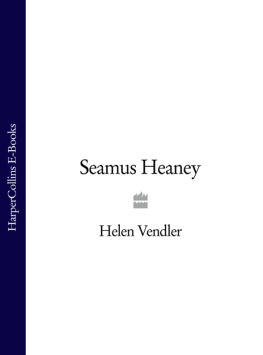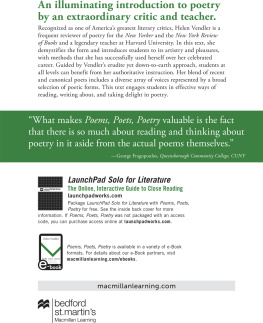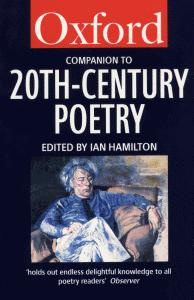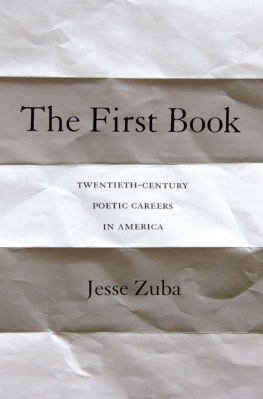HELEN VENDLER
The Ocean, the Bird, and the Scholar
Essays on Poets and Poetry
HARVARD UNIVERSITY PRESS
Cambridge, Massachusetts
London, England
2015
Copyright 2015 by Helen Vendler
All rights reserved
Jacket photo: Salih Ozdemir Ulay / EyeEm Getty Images
Jacket design: Annamarie McMahon Why
978-0-674-73656-6 (hardcover : alk. paper)
978-0-674-42574-3 (EPUB)
978-0-674-42573-6 (MOBI)
978-0-674-42572-9 (PDF)
constitute an extension of the copyright page
The Library of Congress has cataloged the printed edition as follows:
Vendler, Helen, 1933
The ocean, the bird, and the scholar : essays on poets and poetry / Helen Vendler.
pages cm
Includes bibliographical references and index.
1. Poetry. 2. Poetics. I. Title.
PN1031.V365 2015
818.1dc23
2014040692
For Killian and Cline, bearing the future
Contents
Intensities
In giving an account of my life as a critic, I want to begin with the three most intense episodes of my own learning: the most decisive one, the eeriest one, and the most anguishing one.
The most decisive intensity accompanied my instinctive conviction that I should write solely on poetry. When I was in graduate school, one had to classify oneself as a scholar of a certain historical period in England or America. I called myself, when forced to do so, a Victorian. Yet I had seen that many of my teachers, though officially scholars of a given period, were internally something else. These were the poetry peopleRosemond Tuve, Douglas Bushwho, no matter what their period, taught chiefly poetry rather than plays or novels. I sensed that I too belonged to that crypto-group of poetry people, and it gave me a ratifying satisfaction to vow that whatever the profession might think of me, I would always write only about poetry, without confining myself to a single century or a single country. (Some years ago, in the papers of a close friend who had died, I came across a letter I had written to her when I was in my early twenties, describing the poets I wanted to write about: they came from several different periods and from both England and America, so my resolve was firm even then.)
The eeriest intensity of my history was aroused by my discovery, at twenty-three, of the poetry of Wallace Stevens. It was as if my own naked spirit spoke to me from the page. Id read dozens of poets by the time I came across Stevens, and Id memorized scores of poems, but it was through him that I understood style as personality, style as the actual material body of inner being. Before I could make out, in any paraphrasable way, Stevenss poems, I knew, as by telepathy, what they meant emotionally. This experience was so peculiar that I was overcome by a desire to know how that perfusion, which somehow bypassed intellectual translation, was accomplished. All my later work has stemmed from the compulsion to explain the direct power of idiosyncratic style in conveying the import of poetry.
If the discovery of lyric as a field was the most decisive episode of my life as a critic, and the impact of Stevens, revealing to me my consuming interest in linguistic and structural idiosyncrasy, the eeriest one, the most anguishing episode came when I was thirty-four, in 1967. I was divorced, raising my son, David, receiving minimal child support ($90 per month), and working very hard teaching ten courses a yearfour each term (of which one was night-school overload) and two each summer. Id published my dissertation on Yeats in 1963, but I hadnt been able to write in a continuous fashion since then. Id failed to make progress with a book on George Herbert, realizing that Id have to train myself further in Renaissance poetry, a task I didnt then have time for. Instead, I had begun a book on Stevens, but my energy was flagging, and I had no money for child care or household help. One night, exhausted, I tried to think how to make my life easier. I obviously had to continue teaching and keeping house and taking care of my young son. The only way I could make my life easier was to give up writing. They cant make me, I said to myself in panic and fear and rage. They cant make me do that. I suppose They were the Fates, or the Stars, but I knew that to stop writing would be a form of self-murder. I decided to apply for a Fulbright Professorship to obtain a respite. After a year of mandarin leisure in Bordeaux in 19681969, teaching three hours a week, everything improved: I was tenured and had a lighter teaching load; David was a little older.
Because my son was an only child, and I thought he needed an available companion in the house, I had resolved never to work when he was at home and awake. Such as it was, my life of learning and teachingindistinguishable to me from my life of writingwas a patchy, often fatigued, and always anxious one. As my son got older, the precious nighttime hours after he went to sleep shrank in extent; soon, like any adolescent, he was staying up later than I was. My life of studying and writing then began to take place, contrary to my circadian rhythm, in the early hours of the morning. I envied my male colleagues, who, in those days, seemed to have everything done for them by their spouses. Marjorie Nicolsons essay saying that what a woman scholar needed was a wife never seemed truer.
Being a Critic
Over time, Ive written books on poets from Shakespeare to Seamus Heaney, with Herbert and Keats and Yeats and Stevens and Dickinson in between. The choice of a single genre as a field of expertise is still hardly acknowledged in job advertisements, yet how many scholars or critics can teachor write aboutall the genres equally well? The fundamentally different structures of literaturelinear in narrative, dialectic in drama, and concentric in lyricand the historical failures (except in unusual cases) of great poets to write workable plays or novels (or great novelists to write memorable lyrics) suggest basic incompatibilities among the genres. I only once, in want of money, agreed to review a novel (Mary McCarthys Birds of America for the New York Times Book Review), and although I dont think the review was mistaken, I felt such guilt at falsifying my competence that I never again consented to write on fiction.
I must say something about the vocation that separates me from the scholarat least from what the typical scholar is thought to be. Im a critic rather than a scholar, a reader and writer more taken by texts than by contexts. From the time I was very young I continually asked myself, as I read through the works of poets, why some texts seemed so much more accomplished and moving than others. Why was Miltons LAllegro more satisfactory than his On the Death of a Fair Infant Dying of a Cough? I believed, and still do, that anyone literate in poetry could see that the one was superior to the other. (Those who suppose there are no criteria for such judgments merely expose their own incapacity.) Still, to clarify to oneself and then to others, in a reasonable and explicit way, the imaginative individuality of a poem and to give evidence of its architectural and technical skill isnt an easy task. Ive been brought to mute frustration by it when I know intuitively that something is present in the poem that I havent yet been able to isolate or name or describe or solve. In chapter 12 of Lord Jim, Joseph Conrad remarks on that mysterious, almost miraculous, power of producing striking effects by means impossible of detection which is the last word of the highest art. I wanted, hardly knowing how, to detect the means of that power.
A critic of my sort is, I suppose, learned in a waythat is, she has a memory for stories, styles, and structures she has seen before, and she understands the expressive possibilities latent in writing (from the larger forms of myth and narrative to the almost invisible arrangements of prepositions and articles). She remembers the combinations and permutations of words and syntax that she has come across, and is curious about the power of new assemblages. Against the background of known structures, she recognizes and defines original ones, finding names for them and inventing taxonomies in which they might be arranged. Her learning resembles the learning of poets, which, though deeply etymological and architectonic, is often unsystematic and idiosyncratic. She often fails at the most elementary undertakings of scholarly life, such as remembering facts, entering polemical debates, and relating works to the political or philosophical history of their era. She hasat least I haveno capacity for broad synthetic statements.





